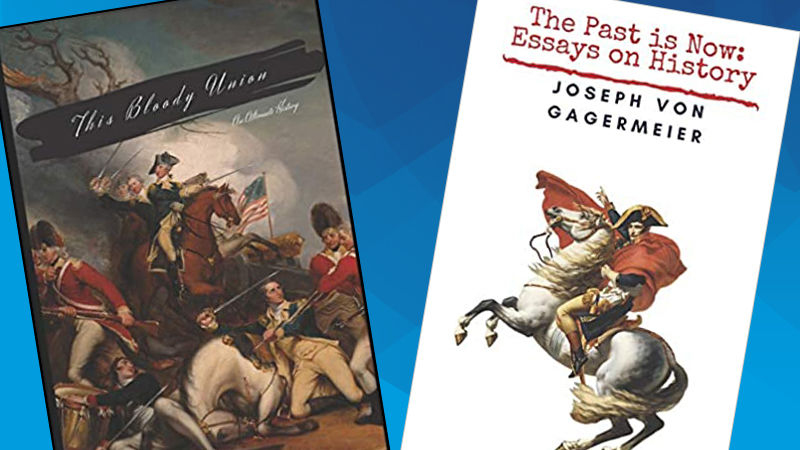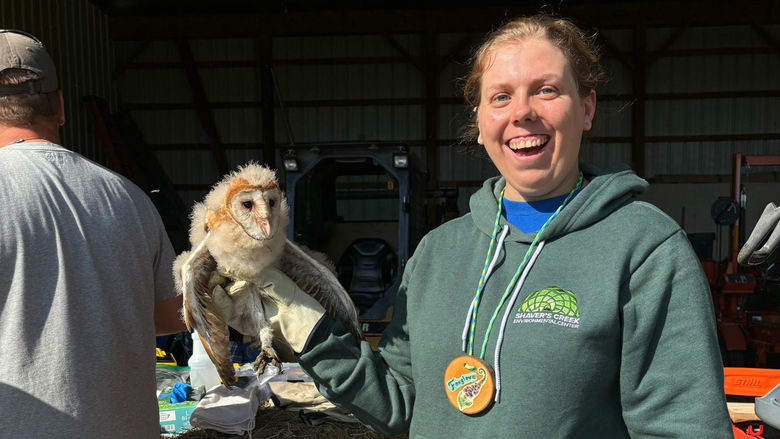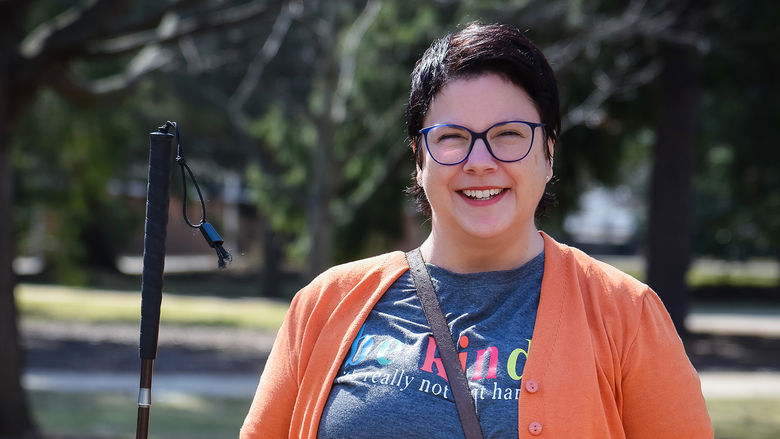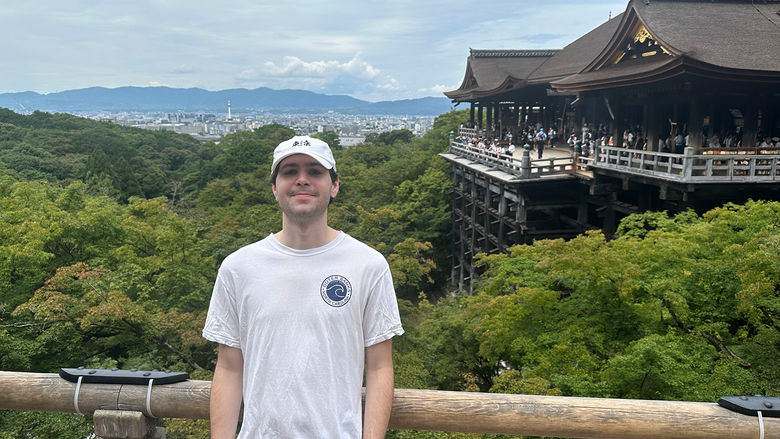

This dialog contains the full navigation menu for this site.

Joe Gagermeier is only heading into his sophomore year at Penn State Altoona, yet he’s already a published author—twice over.
A history major, Gagermeier shares his passion for the past beyond the confines of the classroom through his writing.
Says Jared Frederick, one of Gagermeier’s instructors, “Undergraduate student authors are so rare, and Joe is rising. I suspect he will tackle many more worthy projects before he receives his degree at Penn State Altoona. Joe is a stellar ambassador of our program to the local and academic communities alike.”
Gagermeier published both of his books in 2019. In this Q&A, he explains his love of history and talks about his writing process.
When and how did your love of history begin?
I started really enjoying history after a day trip to Gettysburg when I was 6. I walked the fields of Pickett's Charge, climbed the slopes of Little Round Top, and hid in the gigantic boulders of Devil's Den. I remember thinking that men had sacrificed their lives on that ground for something they believed in, that I was standing in a place where a man of 17 was shot and killed. I wanted to understand why and how such a thing could happen.
What do you love about history and studying it?
The past is a great place to learn from and helps us understand why things are the way they are now. It shows us mistakes and possible solutions to current problems. It shows us our best and worst times. History has given rise to terrible dictators but also great heroes and champions of progress.
Beyond that kind of thing, I think history is fun. There are tons of wacky stories and fascinating facts.
I love studying history not just because it's interesting, but because it is so important to understanding the world we live in now.
Talk about the two books you’ve had published.
My first book, This Bloody Union, is an alternate history novel that investigates what would have happened had the U.S. failed to ratify the constitution. I took inspiration from the Federalist Papers in which Alexander Hamilton warned of this happening. The story follows several founding fathers and a few fictional characters as they try to navigate a fractured America.
My second book is The Past is Now: Essays on History. It’s really a reflection on how I've changed my style of writing and how I have developed as a young historian.
What was the writing process like for you?
The writing process for my first book was much harder than the second. I don't often write fiction, and when I do, I don’t usually finish it. It took about two years of researching and writing and editing and re-editing and re-writing and adding new material. The hardest part for me was making the writing good. Whether it actually is good is obviously open for interpretation.
The essay collection was just going to be a gift for my grandmother who loved history and was always pining to hear any new stories, fun facts, or analyses I had. It was simply going to be a hefty binder of ring-punched pages for her to read. Unfortunately, before I could finish it, she lost her battle with cancer in October 2018. I wanted to do something in her honor, so I compiled those papers and self-published the book.
It's broken up into three parts: my high school papers; essays I've written in my free time; and a paper I wrote for a history course at Penn State Altoona. Interspersed are some personal anecdotes about each paper or my journey to history nerd-dom.I really enjoyed the process of writing both books.
I used Amazon’s publishing company, KDP, that lets any old shmoe like me put his work out there. It has jumpstarted many careers in all fields including history, so maybe one day I'll accomplish my long-time goal of actually being published by a company.
What sets your books apart from others in the history genre?
It’s typical for alternate histories to be pretty strait-laced. I originally planned to make the plot of This Bloody Union realistic, but I also wanted the book to be fun, so I went just weird enough to make it different, but not as crazy as, say, George Washington gets abducted by aliens and Thomas Jefferson moves to China—somewhere far away from the latter, but a few miles beyond the former. There are a lot of fictional characters and always some sort of action going on in each chapter; whether it be a war between the American nations, a battle on the floor of Congress, a slave uprising, or a political scandal, I wanted to encapsulate as much action and interest as I could.
For me, The Past is Now is a reflection on growth. There are plenty of books like that, but I think mine is unique because it’s written from a student historian's viewpoint.
How has Penn State Altoona been supportive of your work?
Jared Frederick, one of my instructors, has been a real champion among the small group of people who helped me with my book. He has been a very active voice in giving me advice and guiding me through the process of how to market.
Mr. Frederick has offered countless gems of advice, one of my favorite being that if I ever give a talk to sell my book I should shave my facial hair to look younger which will encompass more people to buy from a young up and
coming author. He also gave me some pointers on how to structure a talk without revealing anything from the book and mixing it with real historical analysis. A previous Literature class also helped me in putting together more interesting sentences to make my writing better.
How are the books doing sales-wise?
The books are doing pretty good as far as being self-published by an 18-year-old. I haven't had a lot of time to market and promote them via social media, so I have to rely on the help of others to really get the word out there. I've sold about 25 copies—small potatoes, but I was proud to sell just one, even if it was my aunt who bought it.
Do you have more books planned?
I always have ideas tumbling around in my brain for fiction, historical or otherwise.
Currently, I am working on an historical fiction story about a young journalist tasked with interviewing a confederate veteran in 1924. A monument to confederate soldiers is erected in the veteran’s small town and strange happenings begin to occur around it.
I think it would be fun to write a sci-fi book about an epic journey through a strange solar system with plenty of interesting characters and missions.
I'd love to write a book about the Battle of Gettysburg. Sure, it's been done a million times, but I'd still like to take a crack at since it sparked my love of history. I'd also like to write the history of a regiment from my hometown that fought in the civil war, including the battle of Gettysburg, and perhaps get that published through the History Press, which publishes local histories.
What are your plans/hopes for after graduation?
I'd love to work for the National Park Service for a few years, specifically Gettysburg to give tours. I want to get my masters and then my Ph.D. in history so that I can teach what I love.
Where can people connect with you?
I run a history-themed Instagram account, @jvghistory, where I share fun facts and insights from my historical travels. I also have a podcast that can be listened to on Spotify called Days of Yore. Another history podcast with a few other Penn State Altoona history majors is also in the works.


